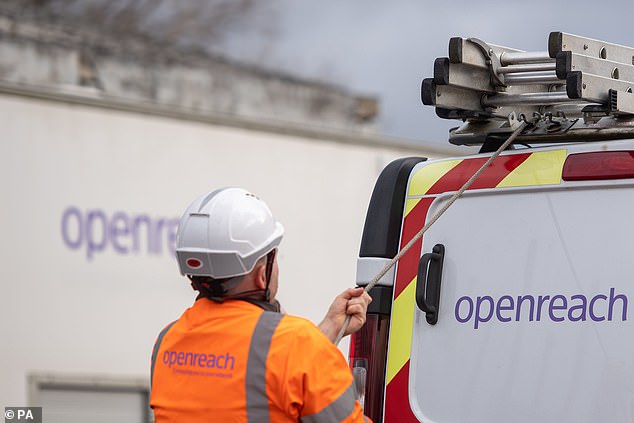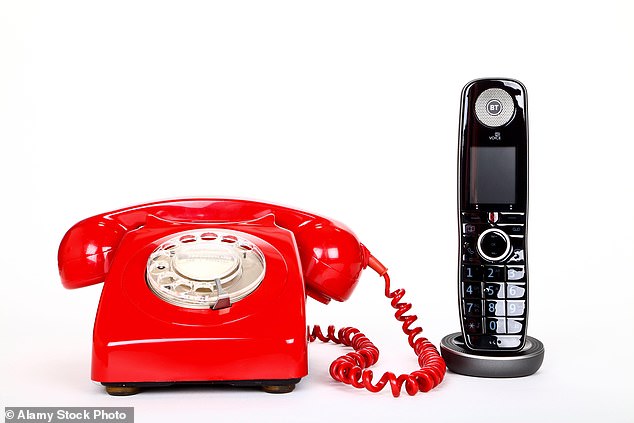Table of Contents
BT is the first telco to scrap a “ridiculous” timeline that would have replaced the country’s aging landlines with digital phone lines by December 2025. The timeline to complete the transition has been pushed back to the end of January 2027.
Other companies including Virgin Media and O2 are expected to follow suit. Money Mail explains everything you need to know about BT’s decision and what steps you should take if you don’t want to have a digital line installed.
Why has the digital deadline been removed?
BT has agreed that more time is needed to ensure customers deemed vulnerable are not forced to use new technology until they are ready.
The previous calendar was branded “ridiculous” by Silver Voices, a campaign group for Britain’s older people.
Up to two million customers rely on Telecare alarm systems – emergency buttons that call emergency services via a landline when pressed and have not yet been adapted to digital lines. The telecommunications giant is giving more time to companies to solve this problem.
BT is removing traditional analogue copper phone lines and installing internet cables
The Achilles heel of digital phone line systems is that you must plug the equipment into an electrical outlet for it to work. This means that if there is a power outage, you may not be able to pick up the phone and dial ‘999’ to emergency crisis services.
For vulnerable people, this can mean the loss of a vital lifeline. BT has devices that can help, such as backup batteries, but more time is needed to ensure the change does not put people at risk.
Why should I have a digital line?
BT is scrapping traditional analogue copper telephone lines and replacing them with internet cables, arguing that the old lines are wearing out and are too expensive to repair. Many homes are already connected to the Internet with fiber optic cables, and there is enough room on the lines to adapt the technology for use in phone calls.
You keep the exact same phone number as before. But instead of using an analog signal for phone calls, a technology known as Voice over Internet Protocol (VoIP) allows you to communicate over a broadband Internet connection. Sound quality should not be much different and line rental charges will not change.
What can I do to avoid it?
Please inform BT that you are a vulnerable customer and as such do not want a digital phone line. Unfortunately, this doesn’t mean it will never happen, but it may delay the change by a couple of years.
Don’t let the telecom giant bully you into submission early. If you don’t feel ready, tell them because the extension of the deadline has given you time.
How can I show that I am vulnerable?
According to BT, no proof is needed. Initially, anyone aged 70 or over could be classed as vulnerable, but this arbitrary age has been removed and any age can now be considered vulnerable. If you are applying for disability benefit, suffering from mental health problems or are confused or anxious about change, this should be enough to consider yourself vulnerable.
Even if you live in isolated areas prone to power outages or without mobile reception, you may still be classified as vulnerable.
The onus is on you to explain that you are vulnerable; Otherwise, they could force you to make the change early against your will.
Contact BT on 0330 1234 150.
Initially, you will be greeted by an automated telephone service, but you will need to speak to a real person to explain that you are vulnerable. To do this, press ‘one’, ‘one’ again and then press ‘five’.
Simply say, “I am a vulnerable customer” and explain why you don’t want to change.
What happens if I don’t use the Internet?
You are a special case. BT has admitted that this select group of 1.5 million people who are not connected to the internet could continue using their old landlines until 2030 if they live in an area without fiber optic cable connections.
Meanwhile, BT says it will work to expand the fiber network over the next few years and will send engineers to install cable access to every home.
How do I know they are changing me?
Expect a letter or postcard in the mail about a month before a proposed change. They may also send you a text message or email. BT’s hard sell may make it look like it has no choice.
Watch for messages like “Home phone service is being upgraded.” We will contact you soon to explain these changes.’
You will then be offered a free palm-sized adapter worth £20 posted before switching. You insert it into an outlet and plug your existing phone into the back of the adapter. It has a remote signal that communicates like wi-fi with your Internet center to allow phone calls using your old phone.
You are also given a date when the change will be made, unless you cancel saying you are vulnerable. After changing it, your old landline phone stops working.
I don’t mean I’m vulnerable
BT says that if you don’t want to switch or admit you’re vulnerable, you should consider canceling your landline or switching to another provider (although this may only delay your digital transition).

In total, all 29 million homes will be digitized following trials in the East Midlands.
But industry regulator Ofcom says providers have an obligation not to disconnect customers from their line until they have “engaged” with them. So if you refuse to respond to any correspondence, be it a letter, phone call, text message, email or even a knock on the door, then you should be able to keep your old phone line.
This is easier said than done. It will be increasingly difficult to ignore such correspondence as the rollout rolls out to all customers over the next few years.
What happens if I have a Telecare alarm?
In theory, it shouldn’t be changed until the technology has been adapted to work, so there’s no cause for concern.
Check with your pending healthcare provider, such as Telecare, and ask when it is expected to change. Home alarm systems connected to emergency services could also stop working if they are not retrofitted. Contact your alarm supplier to discuss the change and whether your security system needs to be adapted.
What happens if there is a power outage?
In the event of a power outage your phone line will stop working, but as long as you have a fully charged mobile phone and a signal this shouldn’t be a disaster.
However, for those living in isolated areas prone to power outages or without mobile reception, BT sells a backup battery pack for £85.
An alternative is an £80 hybrid phone that doubles as a mobile phone if the landline is down. Tell BT you are vulnerable and they should send you these devices for free. Be persistent and explain that you need help.
You also have strong reasons to visit an engineer so they can install the equipment and show you how it works.
Will I have to buy a new phone?
BT says 99 per cent of older phones will work with its Digital Voice service by connecting it to an adapter. But if you fancy a new phone, a BT Essential Digital Home Phone costs £30 and plugs into an internet socket without the need for an adaptor.
Digital phones have a free ‘1571’ voicemail service, but if you already have an answering machine and want to continue using it, you’d be better off continuing with an adapter.
You can also connect your old phone to a modern BT hub. Check the rear of your hub. If it has a removable black sticker, remove it and underneath you should find a traditional green phone jack that you plug your phone into. If you have an old hub, ask BT for a new one.
When will it affect me?
You may already be one of the several million who have changed. In total, 29 million homes are being digitized. Following earlier trials, BT began connecting customers to digital lines in the East Midlands last July.
Yorkshire and the Humber were attacked in August, and Northern Ireland signed up in September. London and the North West began to change last autumn. The rollout was halted in December after a series of “serious incidents” when non-BT telecare systems were found to be unprepared for the digital shift.
BT has shelved the regional rollout plan, for now, and says its main aim this year is to target households with a traditional line that has not been used for the last 12 months.
Following this, it is expected to resume previous expansion plans at the end of the year targeting Wales, other parts of South East England, the West Midlands, the North East, South East and East Anglia and also Scotland.
Some links in this article may be affiliate links. If you click on them, we may earn a small commission. That helps us fund This Is Money and keep it free to use. We do not write articles to promote products. We do not allow any commercial relationship to affect our editorial independence.


